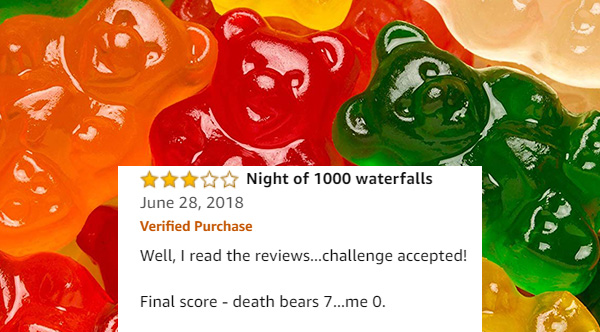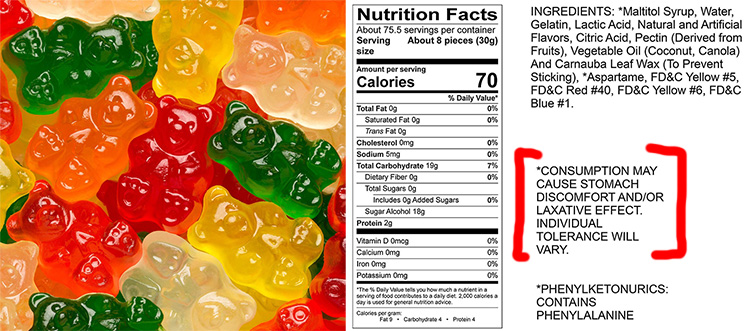When it comes to candy, few items are as beloved as gummy bears. However, the sugar-free variety of these chewy delights, particularly the famous Haribo brand, has garnered its own unique reputation on popular shopping platforms like Amazon. In this article, we will explore the captivating and often comical reviews surrounding sugar-free gummy bears, their unexpected health implications, and the importance of mindful indulgence. As we dissect these user experiences, we will also reinforce positive themes of health, self-love, and balance that resonate with many.

sugar free gummy bear amazon review
The Sweet Temptation of Sugar-Free Treats
For many health-conscious individuals, the allure of sugar-free options is undeniable. Health experts like Dr. Andrew Weil advocate for low-sugar diets, emphasizing the dangers associated with excessive sugar consumption. “Finding alternatives that satisfy your sweet tooth without compromising your health is key,” he remarks. In this context, sugar-free gummy bears seem like the perfect solution. They promise the same delightful chew and fruity flavor as their sugar-laden counterparts but without the calories.

sugar free gummy bear amazon review
A Taste Test That Turns Into a Gastrointestinal Game
Despite their enticing label, reviews often reveal that indulging in Haribo sugar-free gummy bears can lead to unexpected consequences. One reviewer famously stated, “First of all, for taste, I would rate these a 5. So good. Soft, true-to-taste fruit flavors like the sugar variety…BUT (or should I say BIG BUT), prepare for an explosion of gastrointestinal distress!” This encapsulates the duality of their appeal: delicious but dangerous.

sugar free gummy bear amazon review
Understanding the Ingredients: What Makes Sugar-Free Different?
Sugar-free gummy bears are typically sweetened with polyols like sorbitol and maltitol. While these sugar alcohols have fewer calories, they can also act as laxatives when consumed in excess. Renowned nutritionist, Joy Bauer, warns, “People often forget that sugar-free doesn’t mean calorie-free, and these sugar alcohols can wreak havoc on the digestive system.” This warning echoes through many reviews where users experienced painful side effects, often reminisced about in hilariously exaggerated terms.
The Infamous Consequences: Product Reviews That Are Truly Outrageous
The reviews of sugar-free gummy bears have transcended mere product feedback and reached the realm of internet folklore. One viral review encapsulates the sentiment: “See you in hell, Haribo Sugar-Free Gummi Bears!” This sentiment highlights the intense after-effects that many users experience, including gas, bloating, and urgent bathroom trips. Such vivid accounts have made these gummy bears notorious for their unintended consequences, turning a simple candy review into a comedic disaster story.
Health Considerations: A Balanced Perspective
While it’s easy to get swept up in the comedic horror of these reviews, it’s essential to approach sugar-free alternatives with mindfulness. The choice to indulge should always be balanced with awareness of one’s body’s reactions. Dr. Michael Greger, an advocate for whole-food, plant-based diets, advises, “Learning how your body responds to various foods can lead to a healthier, more pleasurable eating experience.” This highlights the importance of self-love and care when choosing snacks, whether they’re sugar-laden or sugar-free.
A Case for Moderation
Many reviewers emphasize that moderation is crucial. Acknowledging their love for gummy bears yet recognizing the aftermath, one reviewer humorously suggested that these treats should only be given as gifts “for someone you hate.” This blend of humor and caution resonates well, urging readers to approach such indulgence with a balanced mindset.
Positive Messaging Around Gummy Bears and Alternatives
Despite the chaotic reviews, it’s essential to highlight the positive aspects of choosing sugar-free options. The ability to enjoy a sweet treat without the burden of excessive sugar is a step towards a healthier lifestyle. Nutritionists encourage exploring a variety of low-calorie sweets and indulging in them responsibly. One expert, Lisa Drayer, emphasizes, “Incorporating small pleasures into a balanced diet is vital for mental and emotional well-being.” It’s a reminder that enjoying treats in moderation can foster a loving and healthy relationship with food.
FAQ: Common Questions About Sugar-Free Gummy Bears
1. Are sugar-free gummy bears safe to eat?
Generally, they are safe, but consuming them in large quantities can cause gastrointestinal distress due to the sugar alcohols used as sweeteners.
2. What are the health risks associated with eating sugar-free gummy bears?
Common side effects include gas, bloating, and diarrhea, particularly when consumed in excess. It’s important to read recommended serving sizes.
3. How do sugar-free gummy bears compare to regular gummy bears in taste?
While many users enjoy their taste, some find them lacking compared to traditional gummy bears, citing differences in texture and flavor.
4. Can sugar-free gummy bears fit into a healthy diet?
Yes, if consumed in moderation, they can be part of a healthy snack rotation, especially for those looking to reduce sugar intake.
5. What should I do if I experience negative side effects after eating sugar-free gummy bears?
If you experience distressing symptoms, it’s best to drink plenty of water and allow your body time to recover. If symptoms persist, consult a healthcare professional.
Conclusion: Finding Balance in Treats
The saga of sugar-free gummy bears serves as both cautionary tale and a humorous exploration of modern snacking. While they open the door to sugar-free indulgence, the experiences shared in countless reviews remind us of the importance of moderation, awareness, and a balanced approach to our diets. As you navigate your own relationship with treats, remember the words of Ralph Waldo Emerson: “The only person you are destined to become is the person you decide to be.” So choose wisely, enjoy in moderation, and laugh heartily along the way.